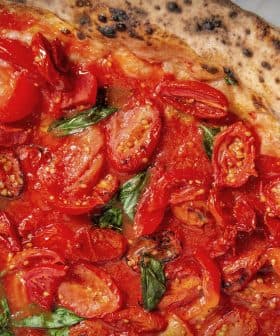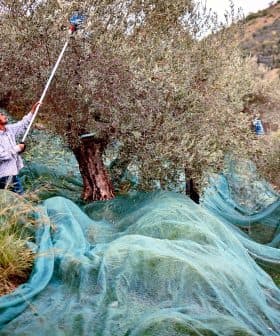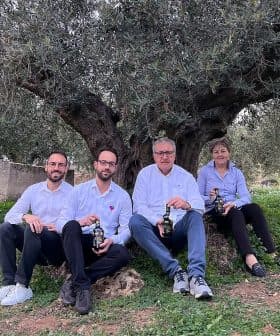PDO Cheese Producers Say Nutri-Score Ignores Italian Culinary Tradition
Afidop, an Italian cheese producers’ association, warns that widespread adoption of Nutri-Score may decrease cheese consumption, with the labels potentially driving producers out of the market. The association is launching a campaign against Nutri-Score, arguing that the labeling system devalues PDO products and could lead to the disappearance of traditional Italian recipes.
Afidop, an Italian cheese producers’ association including many Protected Designation of Origin (PDO) cheeses, has warned that widespread adoption of Nutri-Score may lead to less cheese consumption.
“The label is putting cheeses which are the symbol of Made in Italy at risk,” Afidop said in a press release. “It is now possible that one day we will have a Caprese without the Campania’s buffalo mozzarella or spaghetti in tomato sauce without the Parmigiano Reggiano cheese or even a risotto with radicchio and Gorgonzola with no Gorgonzola in it.”
By penalizing the certified cheeses, Nutri-Score endangers recipes where the presence of that ingredient is a fundamental characteristic, both at home and at the restaurant.
Afidop lamented how the low scores that Nutri-Score gives to cheeses could drive producers out of the market.
The association cited the recent Waste Watcher International survey, which they said confirmed that lower Nutri-Score ratings cause consumers to avoid low-scoring food.
See Also:European Parliament Recommends Adoption of Europe-Wide Food LabelsThe European Commission is currently evaluating the French-born front-of-pack labeling (FOPL) system for mandatory adoption across the European Union.
Nutri-Score is a traffic-light-style label that gives packaged food items one of five letter-color scores, from the healthiest “Green A” down to the “Red E.” The ratings are assigned by an algorithm based on the content of salt, fat, sugar and calories per 100-gram or milliliter sample.
The labels are meant to allow the consumer to compare different food items in the same category at a glance.
The high level of fats in most cheeses translates into lower scores, which have already been defined as “punitive” by the General Confederation of Roquefort, in France.
Meanwhile, iconic Italian cheeses, including Parmigiano Reggiano PDO, Pecorino Romano PDO or Gorgonzola PDO, are all rated with an “Orange D” by the Nutri-Score algorithm.
“We say no to Nutri-Score and those kinds of labels based on fixed amounts,” said Antonio Auricchio, Afidop president. “They are completely detached from the actual consumption in a daily diet.”
“They are deceiving tools which undervalue the PDO products’ reputation and discourage the consumption of our recipes by trivializing the nutritional value of our products,” he added.
To this end, Afidop announced that it is joining forces with the Consortia for the Protection of PDOs to create the “Say No to Nutri-Score” social network campaign and focus on 10 traditional Italian recipes in which cheese plays a distinctive role. With the adoption of Nutri-Score, producers said they worry some of these dishes may disappear.
To reinforce its campaign, Afidop asked Italian physician Luca Piretta, a gastroenterologist and nutritionist, for his opinion on Nutri-Score.
“Diet is a daily behavior,” Piretta said. “It is not made only of one type of food. Not by green-coded food that makes you think you can eat that with no limits, nor by red-coded food that makes that food appear as forbidden. It is education and nutritional consciousness that make the difference.”
Afidop also cited Davide Oldani, a Michelin-star chef, who said, “behind every PDO cheese, there is an enogastronomic heritage made of unique traditions, people, territories and climates.”
“By penalizing the certified cheeses, Nutri-Score endangers recipes where the presence of that ingredient is a fundamental characteristic, both at home and at the restaurant,” he added.
Afidop also referenced official data about Italy’s certified food market value, stating that Nutri-Score would put a €4.2‑billion sector with 55 certified kinds of cheese and 26,000 workers at risk.
According to the association, foods that are symbols of the Mediterranean diet could disappear, and Afidop accuses Nutri-Score of ignoring its principles.
However, Serge Hercberg, Nutri-Score’s creator, previously told Olive Oil Times how the Mediterranean diet primarily promotes consumption of fruits, vegetables and whole grains, only recommending limited consumption of dairy products and meat.
“It favors olive oil among added fats but does not recommend its consumption ad libitum,” he said. “The Mediterranean diet does not, therefore, under any circumstances, as the Italian arguments suggest, promote cheeses and processed meats, whether Italian or not.”
Unsurprisingly, Italian cheese producers have a different opinion.
“We are for correct and complete information for the consumer, aimed at a balanced and healthy diet,” Auricchio concluded. “That is why we join all those in Italy and throughout Europe who believe Nutri-Score is a platform that is deceiving the consumer, and we encourage public institutions to work against the enactment of this proposal.”









